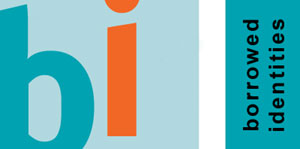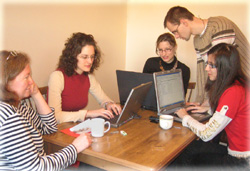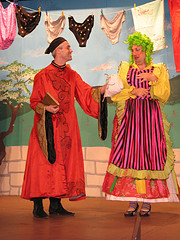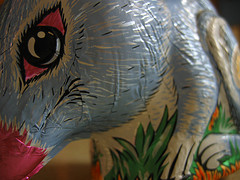 absolutely student-centred
absolutely student-centred
Picking up the subject of our last podcast, today we try to look at another aspect of the same Intensive Programme “Borrowed Identities” which took place in Achill Island, Ireland and brought together 40 learners from all over Europe. We asked two of the students about how the international mix in their cottages and workshops contributed to their intercultural learning. Assja Tietz from Germany and Emma Cuevas from Spain share their experiences about international leadership and teamwork in a community project in internationally mixed teams under time-pressure and in an foreign environment and tell us what they took home from Achill Island for their professional and personal future.
absolutely changeable
Maria Koehnen recently returned home from her second stay abroad this time studying at Lessius Hogeschool in Antwerp, Belgium, and tells us that a semester abroad is not only about learning a new language, but above all about making personal experiences which can change your whole life. We learn how her fellow students benefitted from the opportunity to try out a completely new life style during a semester abroad and how important it is to learn the lesser learned languages such as Dutch.
absolutely successful
Going abroad, whether as a student or as an intern, requires a lot of preparation and both, independent work and professional help. Barbara Neukirchen, an expert in coaching students with their scholarship applications or their semester abroad tells us how the university can help a student to find the right scholarship and what a perfect application should contain. She stresses that the overall picture that the student projects is often more important than just a list of good academic achievements.
absolutely contageous
When you go abroad personal support from your friends, your family or your partner is propably as important as professional advice about scholarships, learning agreements, or visa regulations. We hear from Peter Kron how he helped his girlfriend with her preparations for a semester abroad in China and how this process influenced his own educational future. He seems to have been infected by the “virus” and is now planning his own stay at St. Edward’s University in Austin, Texas
absolutely linguistic
In her new and hopefully regular column, Maria Koenen explains, how a simple litte booklet and a pen in your pocket can be a real help when you are in a foreign country and try to improve your language skills.
The next show will be coming to you on the 4 April from Anne Fox in Denmark.
So long…stay tuned!
The host of this show is: Dr. Laurent Borgmann
Editor: Peter Kron

 Absolutely Educational The main part of this show is devoted to the impressions of two of the teachers who facilitated workshops as part of the ‘Borrowed Identities’ project which brought over 30 students together from Hungary, Germany, the UK, Spain and Lithuania on the west coast island of Achill in Ireland. How did the teachers manage these multi-cultural groups? Were there language problems? Listen as Scott de Francesco from the USA and Dainora Maumevičienė from Lithuania describe the progress of the groups as the week wears on. You can find out more about the project and what went on by reading the
Absolutely Educational The main part of this show is devoted to the impressions of two of the teachers who facilitated workshops as part of the ‘Borrowed Identities’ project which brought over 30 students together from Hungary, Germany, the UK, Spain and Lithuania on the west coast island of Achill in Ireland. How did the teachers manage these multi-cultural groups? Were there language problems? Listen as Scott de Francesco from the USA and Dainora Maumevičienė from Lithuania describe the progress of the groups as the week wears on. You can find out more about the project and what went on by reading the 






